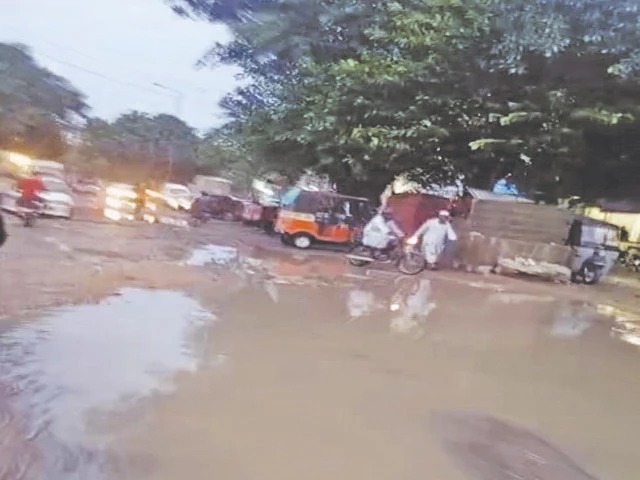Karachi:
The situation in several districts of the metropolis – in particular Gulshan -E -Iqbal – has deteriorated alarmingly after the rain fate of August 19, with residents faced with immense difficulties in the midst of overflowing wastewater, broken roads and an apparent lack of response from the municipal authorities.
According to reports, several blocks of Gulshan-E-Iqbal, including 13-D / 2 and 13-D / 3, were the hardest affected. The streets remain flooded with stagnant sewers, while roads have developed dangerous cracks and nests, which makes them almost impassable for pedestrians and vehicles.
In block 13-D / 2, near the city, the two main roads are immersed in wastewater. Residents say that the situation has gone from bad to worse, damaged roads making daily trips a nightmare. The presence of an illegal pusher parked on the trails has further added to chaos, creating serious obstacles for pedestrians trying to sail in the flooded area.
Similarly, in the 13-D / 3 block, near the Nauman complex, citizens report that even motorcycles and cars are struggling to pass. The roads are broken, slippery and strewn with dirt. Walking, says residents, is no longer an option.
“The streets are no longer recognizable. It is not only a drawback, it is a risk to health,” said a local resident, frustrated by the absence of visible efforts from the authorities to remedy the situation.
Adding to public anger is the absence of local municipal officials. Close to the Phatak railroad, the accumulation of wastewater has not only caused serious traffic interruptions, but also raised concerns about water diseases. Despite repeated attempts, citizens failed to establish contacts with elected officials.
The President of the Union Council and President of the City of Gulshan-E-IQBAL, Dr. Fawad-both affiliated in Jamaat-E-Islami-remained inaccessible, their phones would have been extinguished.
The inhabitants say that they feel abandoned by those who have been elected to serve them. “They come for votes but disappear with regard to action,” said another resident, standing from the ankle in wastewater outside his house.
While residents are starting to move the most affected blocks, the silence and inaction of the authorities raise serious questions about preparation for disasters and governance in the largest metropolis in the country.
Although it is a recurring problem with each monsoon, drainage and road infrastructure in the city remain roughly neglected. Without official response in sight, citizens must manage for themselves, paying the price of administrative apathy and political indifference.




